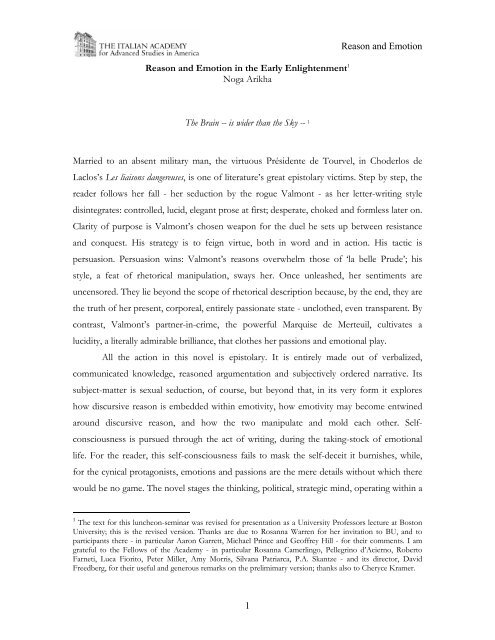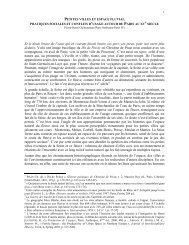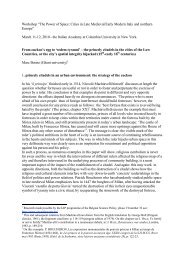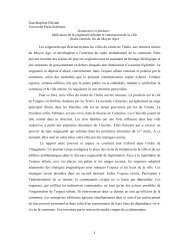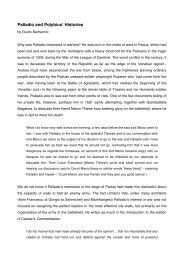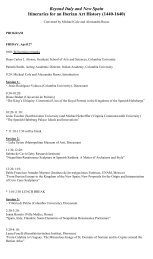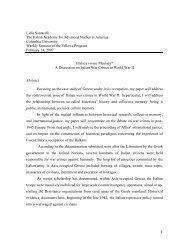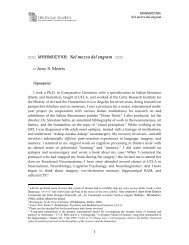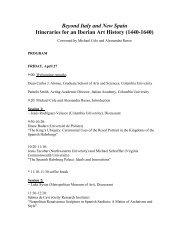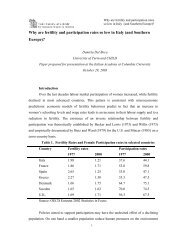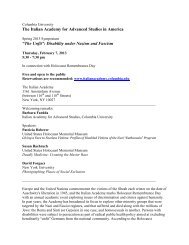Reason and Emotion 1 Reason and Emotion in the Early ...
Reason and Emotion 1 Reason and Emotion in the Early ...
Reason and Emotion 1 Reason and Emotion in the Early ...
You also want an ePaper? Increase the reach of your titles
YUMPU automatically turns print PDFs into web optimized ePapers that Google loves.
<strong>Reason</strong> <strong>and</strong> <strong>Emotion</strong> <strong>in</strong> <strong>the</strong> <strong>Early</strong> Enlightenment 1<br />
Noga Arikha<br />
<strong>Reason</strong> <strong>and</strong> <strong>Emotion</strong><br />
The Bra<strong>in</strong> -- is wider than <strong>the</strong> Sky -- 1<br />
Married to an absent military man, <strong>the</strong> virtuous Présidente de Tourvel, <strong>in</strong> Choderlos de<br />
Laclos’s Les liaisons dangereuses, is one of literature’s great epistolary victims. Step by step, <strong>the</strong><br />
reader follows her fall - her seduction by <strong>the</strong> rogue Valmont - as her letter-writ<strong>in</strong>g style<br />
dis<strong>in</strong>tegrates: controlled, lucid, elegant prose at first; desperate, choked <strong>and</strong> formless later on.<br />
Clarity of purpose is Valmont’s chosen weapon for <strong>the</strong> duel he sets up between resistance<br />
<strong>and</strong> conquest. His strategy is to feign virtue, both <strong>in</strong> word <strong>and</strong> <strong>in</strong> action. His tactic is<br />
persuasion. Persuasion w<strong>in</strong>s: Valmont’s reasons overwhelm those of ‘la belle Prude’; his<br />
style, a feat of rhetorical manipulation, sways her. Once unleashed, her sentiments are<br />
uncensored. They lie beyond <strong>the</strong> scope of rhetorical description because, by <strong>the</strong> end, <strong>the</strong>y are<br />
<strong>the</strong> truth of her present, corporeal, entirely passionate state - unclo<strong>the</strong>d, even transparent. By<br />
contrast, Valmont’s partner-<strong>in</strong>-crime, <strong>the</strong> powerful Marquise de Merteuil, cultivates a<br />
lucidity, a literally admirable brilliance, that clo<strong>the</strong>s her passions <strong>and</strong> emotional play.<br />
All <strong>the</strong> action <strong>in</strong> this novel is epistolary. It is entirely made out of verbalized,<br />
communicated knowledge, reasoned argumentation <strong>and</strong> subjectively ordered narrative. Its<br />
subject-matter is sexual seduction, of course, but beyond that, <strong>in</strong> its very form it explores<br />
how discursive reason is embedded with<strong>in</strong> emotivity, how emotivity may become entw<strong>in</strong>ed<br />
around discursive reason, <strong>and</strong> how <strong>the</strong> two manipulate <strong>and</strong> mold each o<strong>the</strong>r. Selfconsciousness<br />
is pursued through <strong>the</strong> act of writ<strong>in</strong>g, dur<strong>in</strong>g <strong>the</strong> tak<strong>in</strong>g-stock of emotional<br />
life. For <strong>the</strong> reader, this self-consciousness fails to mask <strong>the</strong> self-deceit it burnishes, while,<br />
for <strong>the</strong> cynical protagonists, emotions <strong>and</strong> passions are <strong>the</strong> mere details without which <strong>the</strong>re<br />
would be no game. The novel stages <strong>the</strong> th<strong>in</strong>k<strong>in</strong>g, political, strategic m<strong>in</strong>d, operat<strong>in</strong>g with<strong>in</strong> a<br />
1 The text for this luncheon-sem<strong>in</strong>ar was revised for presentation as a University Professors lecture at Boston<br />
University; this is <strong>the</strong> revised version. Thanks are due to Rosanna Warren for her <strong>in</strong>vitation to BU, <strong>and</strong> to<br />
participants <strong>the</strong>re - <strong>in</strong> particular Aaron Garrett, Michael Pr<strong>in</strong>ce <strong>and</strong> Geoffrey Hill - for <strong>the</strong>ir comments. I am<br />
grateful to <strong>the</strong> Fellows of <strong>the</strong> Academy - <strong>in</strong> particular Rosanna Camerl<strong>in</strong>go, Pellegr<strong>in</strong>o d’Acierno, Roberto<br />
Farneti, Luca Fiorito, Peter Miller, Amy Morris, Silvana Patriarca, P.A. Skantze - <strong>and</strong> its director, David<br />
Freedberg, for <strong>the</strong>ir useful <strong>and</strong> generous remarks on <strong>the</strong> prelimimary version; thanks also to Cheryce Kramer.<br />
1
<strong>Reason</strong> <strong>and</strong> <strong>Emotion</strong><br />
context of ref<strong>in</strong>ed but already decadent <strong>and</strong> self-destructive libert<strong>in</strong>age. Valmont <strong>and</strong> especially<br />
Merteuil are <strong>the</strong> <strong>in</strong>telligent <strong>in</strong>stigators of action, <strong>and</strong> <strong>the</strong> body’s passions are not so much <strong>the</strong><br />
center of action as its tool.<br />
Les liaisons dangereuses had its first pr<strong>in</strong>t run <strong>in</strong> 1782. Clarissa, published some thirtyfive<br />
years earlier, is often cited as its immediate antecedent, <strong>and</strong> probably should be<br />
discussed <strong>in</strong> this context. But my purpose is not to tell a history of <strong>the</strong> epistolary novel <strong>in</strong> <strong>the</strong><br />
Enlightenment; nor to explore <strong>the</strong> development of ‘sensibility’ <strong>in</strong> <strong>the</strong> period. I began <strong>in</strong> pre-<br />
Revolutionary France, so late <strong>in</strong> <strong>the</strong> day with respect to <strong>the</strong> title of this paper, <strong>in</strong> order to be<br />
<strong>in</strong> a position now to retrace <strong>the</strong> orig<strong>in</strong>s of this view, at once familiar <strong>and</strong> sophisticated, of <strong>the</strong><br />
mutual enforcement of potent reason <strong>and</strong> forceful sentiment. The <strong>in</strong>terplay of <strong>the</strong> one with<br />
<strong>the</strong> o<strong>the</strong>r is <strong>the</strong> stuff that ethical deliberation works with; <strong>and</strong> such deliberation ga<strong>in</strong>s from<br />
exposure to a literary vocabulary which encapsulates, ra<strong>the</strong>r than analyses, what is entailed<br />
for <strong>the</strong> human observer to make <strong>in</strong>tellectual sense of <strong>the</strong> diverse, <strong>in</strong>ter-connected strata that<br />
constitute our emotional <strong>and</strong> mental lives. In both content <strong>and</strong> form, <strong>the</strong> epistolary exertions<br />
of Les liaisons dangereuses embody this drive to observe emotion <strong>and</strong> behaviour through <strong>the</strong><br />
sole means of <strong>the</strong> rational m<strong>in</strong>d. The situation of <strong>the</strong> Présidente de Tourvel until her<br />
seduction illustrates <strong>the</strong> two-way relation of reason <strong>and</strong> emotion perfectly: a sense of despair<br />
(emotion A) which arises out of an attachment (emotion B) that destroys social <strong>and</strong><br />
psychological order <strong>and</strong> appeals to vanity (emotion C) coexists with a moral sentiment<br />
whose very existence depends on <strong>the</strong> awareness of a primitive conflict between appetite <strong>and</strong><br />
duty. This moral sentiment, <strong>in</strong> turn, can give rise to <strong>the</strong> fear (emotion D) that it will not be<br />
strong enough to susta<strong>in</strong> <strong>the</strong> rationally mediated awareness of consequence. Embedded<br />
with<strong>in</strong> <strong>the</strong> conception of moral action is thus a series of emotions, jo<strong>in</strong>ed toge<strong>the</strong>r to form<br />
<strong>the</strong> psychological <strong>and</strong> epic narrative of <strong>the</strong> event.<br />
Deliberations about moral action still tend to be connected, however subtly, to <strong>the</strong><br />
Cartesian notion of a self split between steady, supervis<strong>in</strong>g reason - imbued with knowledge<br />
of what constitutes right action - <strong>and</strong> fluctuat<strong>in</strong>g passion - itself ‘right’ <strong>in</strong>sofar as a beautiful<br />
object, say, might ‘rightly’ trigger <strong>the</strong> desire to possess it. But this Platonic, divided self is not<br />
as clear-cut <strong>in</strong> its duality as stereotypical notions of <strong>the</strong> rationalist, post-Cartesian,<br />
Enlightenment era would have it. The realm of knowledge was gradually redef<strong>in</strong>ed dur<strong>in</strong>g<br />
<strong>the</strong> period known as <strong>the</strong> Scientific Revolution, <strong>in</strong> <strong>the</strong> early Enlightenment; so was <strong>the</strong> m<strong>in</strong>d<br />
of <strong>the</strong> knower. It was an <strong>in</strong>tricate process which allowed room for <strong>in</strong>tegrative, ra<strong>the</strong>r<br />
2
<strong>Reason</strong> <strong>and</strong> <strong>Emotion</strong><br />
Aristotelian approaches to emotion. Susan James, <strong>in</strong> her book on <strong>the</strong> emotions <strong>in</strong> <strong>the</strong><br />
seventeenth century, remarked on <strong>the</strong> ‘parodic <strong>in</strong>terpretation of <strong>the</strong> processes by which<br />
knowledge is atta<strong>in</strong>ed’ that results from ‘splitt<strong>in</strong>g off reason from passion’ 2 , <strong>and</strong> noted that<br />
this division has nourished <strong>the</strong> practice of ma<strong>in</strong>stream analytic philosophy as much as <strong>the</strong><br />
study of early modern philosophy. The trend is <strong>in</strong> <strong>the</strong> process of be<strong>in</strong>g reversed by now.<br />
<strong>Emotion</strong>s are, <strong>in</strong> effect, <strong>the</strong> talk of <strong>the</strong> town; <strong>and</strong> philosophical <strong>and</strong> scientific research on<br />
emotions is yield<strong>in</strong>g a much more complex picture of what boundaries exist - if any -<br />
between reason <strong>and</strong> emotion. 3 But I would like to show that <strong>the</strong> historical analysis of this<br />
subtle, perhaps merely epistemically valid division can bear philosophical fruit especially <strong>in</strong><br />
<strong>the</strong> context of <strong>the</strong> grow<strong>in</strong>g body of scientific work on <strong>the</strong> nature of emotion, which Susan<br />
James does not consider. <strong>Emotion</strong>s are part of <strong>the</strong> discourse of ethics, which <strong>the</strong>mselves are<br />
often related to <strong>the</strong> philosophy of action <strong>and</strong> to metaphysics; but <strong>the</strong> possibility of<br />
account<strong>in</strong>g for emotions <strong>in</strong> scientific terms forces a confrontation, much more rare, between<br />
<strong>the</strong> realms of ethics, on <strong>the</strong> one h<strong>and</strong>, <strong>and</strong> of <strong>the</strong> sort of philosophy of m<strong>in</strong>d which takes on<br />
<strong>the</strong> bra<strong>in</strong> sciences, on <strong>the</strong> o<strong>the</strong>r. Ethics <strong>and</strong> <strong>the</strong> philosophy of action take for granted <strong>the</strong><br />
existence of an agency - a rational <strong>and</strong> emotional m<strong>in</strong>d. But what is this biological m<strong>in</strong>d that<br />
is capable of agency? Can <strong>the</strong> m<strong>in</strong>d that is <strong>the</strong> subject of ethical deliberation be <strong>the</strong> same<br />
m<strong>in</strong>d - <strong>the</strong> bra<strong>in</strong> - that is <strong>the</strong> object of empirical study?<br />
The title of this paper, <strong>the</strong>n, is mislead<strong>in</strong>g. I will be concerned with reason, with<br />
emotion, <strong>and</strong> with <strong>the</strong> early Enlightenment. But my central focus is <strong>the</strong> fate of <strong>the</strong> sense of<br />
value - ethical or aes<strong>the</strong>tic - <strong>in</strong> <strong>the</strong> ‘disenchanted’ world of our scientific, digital age. S<strong>in</strong>ce <strong>the</strong><br />
sense of value is <strong>in</strong>flected emotionally, we need to exam<strong>in</strong>e <strong>the</strong> psychological status of<br />
scientific accounts of human emotion, <strong>and</strong> <strong>the</strong> role of reason <strong>in</strong> expla<strong>in</strong><strong>in</strong>g emotion. Insofar<br />
as this question is a take on <strong>the</strong> so-called m<strong>in</strong>d-body problem, it is a philosophical one; but<br />
<strong>the</strong> approach here will be genealogical, ra<strong>the</strong>r than partak<strong>in</strong>g specifically <strong>and</strong> exclusively of<br />
ei<strong>the</strong>r <strong>the</strong> history of philosophy or <strong>the</strong> history of science, <strong>the</strong> philosophy of m<strong>in</strong>d, or <strong>the</strong><br />
cognitive sciences. In this way, I do not deal directly with <strong>the</strong> scientific literature on<br />
emotions, much of it fasc<strong>in</strong>at<strong>in</strong>g, which is grow<strong>in</strong>g every day. Ra<strong>the</strong>r, I shall recount how<br />
early modern treatises which were concerned with <strong>the</strong> body’s passions dealt with <strong>the</strong> notion<br />
of moral responsibility. Dur<strong>in</strong>g <strong>the</strong> seventeenth century, traditional, broadly Galenic<br />
assumptions about <strong>the</strong> humoural, hydraulic nature of emotions were <strong>in</strong>tegrated <strong>in</strong>to <strong>the</strong> new,<br />
mechanistic <strong>and</strong> corpuscularian views of <strong>the</strong> body - notably those of Descartes <strong>and</strong><br />
3
<strong>Reason</strong> <strong>and</strong> <strong>Emotion</strong><br />
Cartesians generally - as well as <strong>in</strong>to <strong>the</strong> anti-mechanist, anti-dualist streams that would later<br />
feed <strong>in</strong>to sensationalism. My ultimate purpose, aga<strong>in</strong>, is to address <strong>in</strong> this diachronic manner<br />
<strong>the</strong> technically arduous but important question of how a naturalistic underst<strong>and</strong><strong>in</strong>g of <strong>the</strong><br />
m<strong>in</strong>d, such as that given by <strong>the</strong> cognitive sciences today, can be reconciled with a<br />
foundationalism with regard to ethics - or, succ<strong>in</strong>ctly put, how we can hold on to value <strong>in</strong><br />
<strong>the</strong> absence of teleology.<br />
***<br />
The difficulty of answer<strong>in</strong>g this question is <strong>in</strong> part due to <strong>the</strong> complexity of <strong>the</strong> very<br />
operation of ask<strong>in</strong>g it. In <strong>the</strong> Spectator of July 2 nd , 1712, Joseph Addison (1672-1719) mused<br />
about ‘<strong>the</strong> proper limits, as well as <strong>the</strong> defectiveness, of our imag<strong>in</strong>ation; how it is conf<strong>in</strong>ed<br />
to a very small quantity of space, <strong>and</strong> immediately stopped <strong>in</strong> its operations, when it<br />
endeavours to take <strong>in</strong> very great, or very little.’ Imag<strong>in</strong>ation was here depicted as a conta<strong>in</strong>er<br />
of sorts which marked <strong>the</strong> concrete, outer boundary of reason. <strong>Reason</strong>, wrote Addison, was<br />
capable of pursu<strong>in</strong>g ‘a particle of matter through an <strong>in</strong>f<strong>in</strong>ite variety of divisions’,<br />
but <strong>the</strong> fancy soon loses sight of it, <strong>and</strong> feels <strong>in</strong> itself a k<strong>in</strong>d of chasm, that wants to<br />
be filled with matter of a more sensible bulk. We can nei<strong>the</strong>r widen nor contract <strong>the</strong><br />
faculty to <strong>the</strong> dimensions of ei<strong>the</strong>r extreme. The object is too big for our capacity,<br />
when we would comprehend <strong>the</strong> circumference of a world, <strong>and</strong> dw<strong>in</strong>dles <strong>in</strong>to<br />
noth<strong>in</strong>g, when we endeavour after <strong>the</strong> idea of an atom.<br />
It was very well to derive knowledge from <strong>in</strong>direct sense-experience that <strong>the</strong>re existed<br />
<strong>in</strong>f<strong>in</strong>itely large <strong>and</strong> <strong>in</strong>f<strong>in</strong>itely small dimensions; but <strong>the</strong> fancy - <strong>the</strong> imag<strong>in</strong>ation - was <strong>in</strong>capable<br />
of do<strong>in</strong>g much about it. <strong>Reason</strong> had its reasons, while we were bound to fancies of our own<br />
dimension. We could not imag<strong>in</strong>e ourselves out of our human sphere, however capable we<br />
were of accept<strong>in</strong>g as reasonable <strong>the</strong> knowledge that o<strong>the</strong>r dimensions existed, <strong>and</strong> that we<br />
were experientally bound with<strong>in</strong> this limited sphere of ours. Experience, <strong>in</strong> o<strong>the</strong>r words, had<br />
little to do with reason’s work.<br />
A few years earlier, Locke had expressed a similar notion <strong>in</strong> his Essay Concern<strong>in</strong>g<br />
Human Underst<strong>and</strong><strong>in</strong>g: acknowledg<strong>in</strong>g that <strong>the</strong>re were hidden worlds - such as particles with<strong>in</strong><br />
blood - which it was <strong>the</strong> mission of <strong>the</strong> natural sciences to uncover, he never<strong>the</strong>less hesitated<br />
to accept that we were <strong>in</strong> a position to underst<strong>and</strong> fully what we did not see directly. Indeed,<br />
4
<strong>Reason</strong> <strong>and</strong> <strong>Emotion</strong><br />
with any alteration of our senses, he wrote, ‘<strong>the</strong> appearance <strong>and</strong> outward Scheme of th<strong>in</strong>gs<br />
would have quite ano<strong>the</strong>r Face to us; <strong>and</strong> I am apt to th<strong>in</strong>k, would be <strong>in</strong>consistent with our<br />
Be<strong>in</strong>g’, for <strong>the</strong>y would ‘produce quite different Ideas <strong>in</strong> us’ (II, xxii, 12). Hidden worlds could<br />
unsettle our gaze <strong>and</strong> our position <strong>in</strong> <strong>the</strong> naturally knowable world. Lockean ideas orig<strong>in</strong>ated<br />
<strong>in</strong> <strong>the</strong> senses; but <strong>the</strong>y were cogitations produced by <strong>the</strong> imag<strong>in</strong>ation. At once dependent on<br />
our senses <strong>and</strong> limited by <strong>the</strong>m, <strong>the</strong> eighteenth-century imag<strong>in</strong>ation was central to ord<strong>in</strong>ary<br />
cognition <strong>and</strong> to <strong>the</strong> capacity for wonder, but also a measure of what one should deem<br />
‘<strong>in</strong>consistent with our Be<strong>in</strong>g’.<br />
I would like to stay for a while with this notion that a form of knowledge may be<br />
‘<strong>in</strong>consistent with our Be<strong>in</strong>g’. The immediate, historical context of this statement deflates it<br />
somewhat, if one considers that Locke was, generally, try<strong>in</strong>g to def<strong>in</strong>e what constituted <strong>the</strong><br />
bounds with<strong>in</strong> which human knowledge was possible, <strong>and</strong> desirable <strong>in</strong> social terms. Taken<br />
on its own, however, <strong>the</strong> statement certa<strong>in</strong>ly po<strong>in</strong>ts to <strong>the</strong> centrality of <strong>the</strong> knower’s m<strong>in</strong>d <strong>in</strong><br />
evaluat<strong>in</strong>g <strong>the</strong> usability, that is, <strong>the</strong> relevance of scientific data. Awareness of <strong>the</strong> problems<br />
that naturalism has posed to epistemology was well summed up by Qu<strong>in</strong>e <strong>in</strong> 1969, <strong>in</strong><br />
‘Epistemology Naturalized’, where he contraposed <strong>the</strong> ‘meager <strong>in</strong>put’ of natural causes <strong>in</strong>to<br />
our senses <strong>and</strong> <strong>the</strong> ‘torrential <strong>in</strong>put’ of scientific knowledge. In a similar way, naturalistic<br />
accounts of emotion, passed on from antiquity, posed - <strong>and</strong> failed to resolve - <strong>the</strong> question<br />
of <strong>the</strong> status of <strong>the</strong> new science with regard to <strong>the</strong> morally perplexed, emotionally confused,<br />
natural (embodied, humoural) but socialized (communicat<strong>in</strong>g, verbal) human be<strong>in</strong>g, still well<br />
represented, decades after Locke, by our Présidente de Tourvel. The unease generated today<br />
by <strong>the</strong> expulsion of teleology from <strong>the</strong> biological analysis of m<strong>in</strong>d, emotion <strong>and</strong><br />
consciousness is not very different from this early modern distrust of naturalism. This<br />
distrust is a matter of some complexity, at a time when life sciences - particularly genetics<br />
<strong>and</strong> <strong>the</strong> neurosciences - are grow<strong>in</strong>g <strong>in</strong> sophistication, that is, <strong>in</strong> <strong>the</strong>ir capacity to give us a<br />
sharp picture of <strong>the</strong> structures of which our organisms are made. Bra<strong>in</strong> imag<strong>in</strong>g techniques<br />
are help<strong>in</strong>g us identify <strong>in</strong> <strong>in</strong>creas<strong>in</strong>gly precise terms what is go<strong>in</strong>g on <strong>in</strong> <strong>the</strong> bra<strong>in</strong> when we<br />
feel pa<strong>in</strong>, for <strong>in</strong>stance, or when we recognize <strong>the</strong> face of a loved one.<br />
But our experience of fear, or of facial recognition, is very different <strong>in</strong> k<strong>in</strong>d from our<br />
perception of whatever we are able to detect on an fMRI scan. Granted, this trivial<br />
difference should not detract from <strong>the</strong> explanatory value of bra<strong>in</strong> imag<strong>in</strong>g techniques, but it<br />
does po<strong>in</strong>t to <strong>the</strong> problem of accomodat<strong>in</strong>g <strong>the</strong> objective language <strong>and</strong> objectify<strong>in</strong>g<br />
5
<strong>Reason</strong> <strong>and</strong> <strong>Emotion</strong><br />
methodology of science to <strong>the</strong> study of human subjectivity. So for example, it is hard to<br />
know what to make of an evolutionary account of anger, say, or what to do with a<br />
neurobiological analysis of fear. Even if one accepts that a mental state, such as fear, is fully<br />
reducible to its cerebral correlates, such as activity <strong>in</strong> <strong>the</strong> amygdala, <strong>the</strong> awareness of this<br />
reducibility will have noth<strong>in</strong>g to do with <strong>the</strong> experience of fear <strong>and</strong> will not formally differ,<br />
<strong>in</strong> <strong>the</strong> first <strong>in</strong>stance, from <strong>the</strong> very different claim that fear is merely redescribable as activity<br />
<strong>in</strong> <strong>the</strong> amygdala. In this way, a naturalized, biological account - whe<strong>the</strong>r evolutionary,<br />
modular, or neurophysiological - of fear or jealousy will not automatically help us know how<br />
to act <strong>in</strong> <strong>the</strong> presence of <strong>the</strong>se emotions: raw descriptions of this sort are <strong>in</strong>deed value-free<br />
from an ethical po<strong>in</strong>t of view.<br />
On <strong>the</strong> o<strong>the</strong>r h<strong>and</strong>, <strong>the</strong> view that mental events bear a causal or functional relation<br />
with <strong>the</strong> bra<strong>in</strong>’s biochemistry can have <strong>in</strong>strumental value when applied to <strong>the</strong> care of mental<br />
illnesses amenable to chemical treatments. Jonathan Glover recently devoted his Tanner<br />
lectures to what he has named ‘humanist psychiatry’, which acknowledges schizophrenic, or<br />
manic-depressive, or ‘split-personality’ patients as whole persons - <strong>and</strong> thus full moral agents<br />
regardless of <strong>the</strong>ir state of m<strong>in</strong>d - <strong>and</strong> takes seriously <strong>the</strong> ill-def<strong>in</strong>ed nature of <strong>the</strong> boundary<br />
between <strong>the</strong> person <strong>and</strong> <strong>the</strong> illness. The problems addressed <strong>in</strong> those lectures are <strong>in</strong>creas<strong>in</strong>gly<br />
discussed with<strong>in</strong> <strong>the</strong> fields of ethics <strong>and</strong> <strong>the</strong> philosophy of psychiatry. But a philosopher of<br />
m<strong>in</strong>d might argue that <strong>the</strong> foundations of Glover’s laudable stance depend on a conclusive<br />
account of <strong>the</strong> ways <strong>in</strong> which a relation of some sort between mental events <strong>and</strong> bra<strong>in</strong> states<br />
is non-determ<strong>in</strong>istic with regard to a sense of selfhood, consciousness <strong>and</strong> so on. If one<br />
prescribes Prozac on <strong>the</strong> perfectly plausible basis that depression is, to some extent, or, as<br />
might be <strong>the</strong> case, fully caused by a dysfunction of seroton<strong>in</strong> secretion, what exactly are <strong>the</strong><br />
criteria for evaluat<strong>in</strong>g <strong>the</strong> border beyond which <strong>the</strong> person’s sense of self is not fully<br />
determ<strong>in</strong>ed by neurotransmitters? In o<strong>the</strong>r words, how do we f<strong>in</strong>d out what, <strong>the</strong> person or<br />
<strong>the</strong> illness, <strong>the</strong> psychiatrist is treat<strong>in</strong>g, <strong>and</strong> how do we def<strong>in</strong>e <strong>the</strong> one versus <strong>the</strong> o<strong>the</strong>r? And<br />
if, conversely, <strong>the</strong> ‘person’ is def<strong>in</strong>able, say, <strong>in</strong> terms of <strong>the</strong> Lockean concept of a unity of<br />
self, where does that leave our limited knowledge of cerebral activity? Shouldn’t we at least<br />
be referr<strong>in</strong>g to those amply documented, but not fully <strong>in</strong>terpreted, stories of bra<strong>in</strong>-damaged<br />
patients whose body-image has changed dramatically? 4 It is probably true that <strong>the</strong><br />
neurological, molecular, chemical, electric functions of <strong>the</strong> bra<strong>in</strong> are so numerous that<br />
6
<strong>Reason</strong> <strong>and</strong> <strong>Emotion</strong><br />
determ<strong>in</strong>ism can, <strong>and</strong> should, be kept apart from all levels of reductionism. But <strong>the</strong><br />
conceptual moves to do so are complex, <strong>and</strong>, aga<strong>in</strong>, <strong>in</strong>conclusive. 5<br />
Such questions might not seem problematic from a scientific po<strong>in</strong>t of view, but this<br />
is precisely why <strong>the</strong>y do promise much philosophical meat: as Andrew Solomon wrote <strong>in</strong> his<br />
book on depression, The Noonday Demon, ‘Hippocrates is, <strong>in</strong> effect, <strong>the</strong> gr<strong>and</strong>fa<strong>the</strong>r of Prozac;<br />
Plato is <strong>the</strong> gr<strong>and</strong>fa<strong>the</strong>r of psychodynamic <strong>the</strong>rapy’. 6 In crude terms, one may say that <strong>the</strong><br />
one trades <strong>in</strong> physical events - effects; while <strong>the</strong> o<strong>the</strong>r deals with - putative - mental causes.<br />
At issue is <strong>the</strong> problem of br<strong>in</strong>g<strong>in</strong>g <strong>the</strong> two toge<strong>the</strong>r to form one account, if not one<br />
practice. This cannot be a simple task, partly, or perhaps especially because of <strong>the</strong> very<br />
nature of <strong>the</strong> m<strong>in</strong>d without which <strong>the</strong>re would be no scientific enquiry <strong>in</strong> <strong>the</strong> first place.<br />
When I am sad, say, or feel emotionally confused, I can be sure that reason st<strong>and</strong>s,<br />
untouched, a constant observer, a guarantor of <strong>the</strong> self’s narrative unity. The differentiation<br />
of <strong>the</strong> ‘emotional’ bra<strong>in</strong> from <strong>the</strong> traditionally ‘higher’, neo-cortical, th<strong>in</strong>k<strong>in</strong>g bra<strong>in</strong>, matches<br />
our <strong>in</strong>trospective sense of a functional division between <strong>the</strong> two contemporary events. But<br />
this sense is itself fragile. Certa<strong>in</strong> cases of bra<strong>in</strong>-damage can distort precisely <strong>the</strong> sense of <strong>the</strong><br />
unity of consciousness, of Kant’s ‘transcendental unity of apperception’. Our capacity to<br />
postulate <strong>the</strong>ories about <strong>the</strong> world <strong>and</strong> about ourselves is not immune from error. Yet <strong>the</strong><br />
possibility that our capacity to posit a concept such as ‘transcendental’ might well be a<br />
product of bra<strong>in</strong> structure need not unravel <strong>the</strong> very bear<strong>in</strong>g of <strong>the</strong> concept of<br />
‘transcendental’.<br />
<strong>Emotion</strong>s are complex partly because <strong>the</strong>y are <strong>the</strong> product of perceptions or sensations, <strong>and</strong><br />
sometimes of thoughts, <strong>and</strong> can <strong>the</strong>mselves cause fur<strong>the</strong>r perceptions, sensations or<br />
thoughts. They can range from sense-driven reactions to overlapp<strong>in</strong>g cognitive states such as<br />
those experienced by <strong>the</strong> Présidente de Tourvel, <strong>and</strong> which <strong>in</strong>volve appetite, thought, <strong>and</strong><br />
will, as well as <strong>the</strong> sadness, despair, anger <strong>and</strong> joy that, for <strong>the</strong> scholastics 7 as much as for<br />
contemporary emotion <strong>the</strong>orists like Paul Ekman, 8 are a few of <strong>the</strong> ‘officially’ registered<br />
emotions. The new science of emotions, however, is as young as is ancient <strong>the</strong> art of<br />
observ<strong>in</strong>g <strong>the</strong>m; <strong>and</strong> it is faced with <strong>the</strong> humanist’s <strong>in</strong>terpretive difficulties shared by all m<strong>in</strong>d<br />
sciences. This is why a historical perspective helps. The first-century physician <strong>and</strong><br />
philosopher Galen understood emotion as humoural, as <strong>the</strong> product, or equivalent, or<br />
correlate (it was not clear which) of physical substances; <strong>the</strong> <strong>in</strong>terpretive problems this<br />
7
<strong>Reason</strong> <strong>and</strong> <strong>Emotion</strong><br />
notion gave rise to are, <strong>in</strong> some sense, still ours. Aga<strong>in</strong>, <strong>and</strong> as I’ll expla<strong>in</strong> <strong>in</strong> a m<strong>in</strong>ute, <strong>the</strong><br />
physiology derived from Galen rema<strong>in</strong>ed st<strong>and</strong>ard fare beyond revolutions <strong>in</strong> anatomy from<br />
<strong>the</strong> sixteenth century on - which revised many Galenic beliefs about anatomy previously held<br />
as sacrosanct - <strong>and</strong> beyond <strong>the</strong> breakdown, dur<strong>in</strong>g <strong>the</strong> scientific revolution <strong>in</strong> <strong>the</strong><br />
seventeenth century, of <strong>the</strong> faculty psychology on which this physiology depended.<br />
But as with most tenacious models, major presuppositions about <strong>the</strong> nature of<br />
mental function rema<strong>in</strong>ed beyond <strong>the</strong> demise of faculty psychology, even as <strong>the</strong>ir mean<strong>in</strong>g<br />
<strong>and</strong> import shifted along with <strong>the</strong> culture - <strong>and</strong> beyond Descartes. Passions cont<strong>in</strong>ued for a<br />
while to be tied to <strong>the</strong> irascible <strong>and</strong> concupiscible functions of <strong>the</strong> sensitive soul of <strong>the</strong><br />
scholastics, that is, to motions that were triggered by exposure to objects liable to cause<br />
passions. Treatises on <strong>the</strong> passions which dealt with such matters were conceived as moral<br />
guides; but <strong>the</strong>ir basic assumptions concern<strong>in</strong>g <strong>the</strong> m<strong>in</strong>d-body <strong>in</strong>teraction were <strong>in</strong>formed by<br />
this hybrid psychology whose roots were historically ‘long’ <strong>and</strong> whose outlook was not<br />
especially novel. The very language of such treatises came from Plato <strong>and</strong> Aristotle via<br />
August<strong>in</strong>e <strong>and</strong> Thomas Aqu<strong>in</strong>as, <strong>and</strong> was rooted <strong>in</strong> <strong>the</strong> ground of Stoicism <strong>and</strong><br />
Epicureanism. With<strong>in</strong> that scheme, reason had <strong>the</strong> same relationship to passion as it did to<br />
body.<br />
François de La Mo<strong>the</strong> Le Vayer (1588-1672), for example, a statesman, magistrate,<br />
Pyrrhonist, scholar <strong>and</strong> tutor to <strong>the</strong> bro<strong>the</strong>r of Louis XIV, <strong>the</strong> Duc d’Anjou (later Duc<br />
d’Orléans), <strong>in</strong> his didactic compendium De l’<strong>in</strong>struction de Monseigneur le Dauph<strong>in</strong>, 9 argued that<br />
<strong>the</strong>re was a fundamental difference between ‘moral action <strong>and</strong> human action’. 10 Moral<br />
actions depended on <strong>the</strong> presence of <strong>the</strong> will, <strong>and</strong> of <strong>the</strong> underst<strong>and</strong><strong>in</strong>g - ‘entendement’ -<br />
which was necessary to <strong>the</strong> will. 11 O<strong>the</strong>r human actions were those performed ei<strong>the</strong>r under<br />
constra<strong>in</strong>t, or by ‘madmen, little children, <strong>and</strong> sleepers’, or were <strong>in</strong>different gestures, which<br />
‘tended nei<strong>the</strong>r to vice, nor to virtue’ - those which ‘make you hop with joy, w<strong>and</strong>er without<br />
a purpose, pick up a wisp of turf or brush up our moustache’. 12 This sort of ethics was based<br />
on a voluntarism which guided at once conduct <strong>and</strong> deliberation about conduct, <strong>and</strong> which<br />
was a central feature of <strong>the</strong> Thomistic psychology favoured dur<strong>in</strong>g <strong>the</strong> Renaissance. For La<br />
Mo<strong>the</strong>, we thus had two appetites, one rational - ‘raisonnable’ - <strong>and</strong> dependent on <strong>the</strong> will;<br />
<strong>the</strong> o<strong>the</strong>r sensitive, ‘sensible’, perta<strong>in</strong><strong>in</strong>g to beasts as well as passions. The sensitive appetite,<br />
<strong>in</strong> turn, was ei<strong>the</strong>r concupiscible, <strong>and</strong> led us to seek out <strong>the</strong> good <strong>and</strong> flee <strong>the</strong> bad; or<br />
irascible, which reacted to <strong>the</strong> difficulties that resulted from <strong>the</strong> attractions or repulsions of<br />
8
<strong>Reason</strong> <strong>and</strong> <strong>Emotion</strong><br />
<strong>the</strong> concupiscible appetite. 13 The functions of <strong>the</strong> rational appetite or soul differed from<br />
those of <strong>the</strong> sensitive appetite or soul, <strong>in</strong>sofar as <strong>the</strong>y perta<strong>in</strong>ed to cogitation, imag<strong>in</strong>ation<br />
<strong>and</strong> memory; reason was thus necessary to <strong>the</strong> existence of a moral sense which, <strong>in</strong> turn, was<br />
central to this picture of mental organization. Actions, whe<strong>the</strong>r good or bad, were excited by<br />
passions, wrote La Mo<strong>the</strong>, <strong>and</strong> so <strong>in</strong> order to underst<strong>and</strong> actions, one had first to consider<br />
passions, ‘named perturbations by <strong>the</strong> Lat<strong>in</strong> philosophers, <strong>and</strong> <strong>in</strong>deed <strong>the</strong>y are natural<br />
emotions, which take place <strong>in</strong> <strong>the</strong> sensitive part [of <strong>the</strong> soul], where <strong>the</strong>y are based’. 14 Moral<br />
responsibility <strong>the</strong>refore depended on awareness mediated by reason, which, <strong>in</strong> turn, had a<br />
cognitive impact on <strong>the</strong> o<strong>the</strong>r appetites.<br />
On this basis, treatises on <strong>the</strong> passions could proceed apace, unimpeded by<br />
revolutions <strong>in</strong> physics or metaphysics. More to <strong>the</strong> po<strong>in</strong>t, practical guides to <strong>the</strong> well-be<strong>in</strong>g<br />
of noble souls belonged to <strong>the</strong> realm of moral philosophy, which itself <strong>in</strong>cluded ethics,<br />
politics <strong>and</strong> economics. La Mo<strong>the</strong>’s guide - which was highly regarded <strong>in</strong> mid-18 th -century<br />
France <strong>and</strong> was pr<strong>in</strong>ted by <strong>the</strong> Dresden publishers of Hume <strong>in</strong> French 15 - conta<strong>in</strong>ed all three.<br />
Psychology was a different matter, <strong>and</strong> concerned <strong>the</strong> fate of <strong>the</strong> tripartite soul. Although,<br />
aga<strong>in</strong>, faculty psychology was rapidly los<strong>in</strong>g credibility <strong>in</strong> <strong>the</strong> seventeenth century, it<br />
cont<strong>in</strong>ued to be taught <strong>in</strong> schools, <strong>and</strong>, as is apparent here, <strong>in</strong> no way did it vanish overnight<br />
to be replaced wholesale by a br<strong>and</strong> new system. La Mo<strong>the</strong> was a savant who was happy to<br />
cite Clement of Alex<strong>and</strong>ria’s epi<strong>the</strong>t for lust, ‘la Metropolita<strong>in</strong>e de tous les Vices’, just as he<br />
was comfortable with <strong>the</strong> notion that young people, <strong>and</strong> all those who had boil<strong>in</strong>g blood,<br />
were easily prone to enterta<strong>in</strong> hope - on account of <strong>the</strong>ir <strong>in</strong>experience - <strong>and</strong> that <strong>the</strong> old,<br />
whose blood was cold, found it hard to do so - because of <strong>the</strong>ir experience. (Blood seemed<br />
to be <strong>the</strong>re for good form; but that <strong>in</strong> itself is significant.)<br />
The concordance of emotion with bodily motion was by that po<strong>in</strong>t a trope,<br />
susta<strong>in</strong><strong>in</strong>g treatises on physiognomy <strong>and</strong> aes<strong>the</strong>tics, as well as <strong>the</strong> practice of caricature, for<br />
<strong>in</strong>stance. Mar<strong>in</strong> Cureau de la Chambre, royal physician <strong>and</strong> one of <strong>the</strong> found<strong>in</strong>g members of<br />
<strong>the</strong> Académie des Sciences created by Colbert <strong>in</strong> 1666, began his own treatise on <strong>the</strong><br />
passions with <strong>the</strong> popular view that ‘la Nature’ had endowed <strong>the</strong> human face with a faculty<br />
of expression ak<strong>in</strong> to language, for <strong>the</strong> sake of ‘la vie Civile’ to which it, Nature, had dest<strong>in</strong>ed<br />
man: ‘so that if his word were to belie his heart, his face would belie his word’. 16 It was<br />
evident that ‘<strong>the</strong> body changes when <strong>the</strong> soul is moved’, 17 <strong>and</strong> that emotions were made<br />
manifest via moral <strong>and</strong> corporeal ‘Characteres’, as he called <strong>the</strong>m. Human actions, <strong>the</strong><br />
9
<strong>Reason</strong> <strong>and</strong> <strong>Emotion</strong><br />
former type of character, were <strong>the</strong> <strong>in</strong>ternal emotion formed by <strong>the</strong> object <strong>in</strong> <strong>the</strong> appetite -<br />
actions were due to emotions that were caused by objects. 18 The latter type of character was<br />
due to an ‘Air sur le visage’, a ‘je ne sçay quoy’ brought on by <strong>the</strong> passion, ‘<strong>and</strong> which virtue<br />
br<strong>in</strong>gs <strong>in</strong>to its actions a certa<strong>in</strong> grace, a pleasant counteance which is not found <strong>in</strong> vicious<br />
ones’. 19 This ‘Air’ could be perceived <strong>in</strong> portraits: ‘<strong>the</strong> grace of a beautiful face can be<br />
expressed through colour’. 20 Grace was <strong>in</strong>herent <strong>in</strong> <strong>the</strong> colour, figure <strong>and</strong> movement of parts<br />
<strong>and</strong> spirits, but, just as sounds were only pleasant <strong>in</strong>sofar as <strong>the</strong>y bore a certa<strong>in</strong> proportion to<br />
one ano<strong>the</strong>r, so <strong>the</strong>se visual elements had to bear a relation to one ano<strong>the</strong>r ‘which pleases<br />
<strong>the</strong> eye <strong>and</strong> contents <strong>the</strong> soul’. 21 Beyond that, Cureau was not sure about what exactly grace,<br />
or that ‘Air’, was, but he was sure that it was conta<strong>in</strong>ed with<strong>in</strong> passions <strong>and</strong> moral actions,<br />
<strong>and</strong> that it was a function of movement. The cause of movement needed to be <strong>in</strong>vestigated<br />
<strong>in</strong> order for <strong>the</strong> nature of passions to be understood - emotions of <strong>the</strong> appetite ‘by which <strong>the</strong><br />
soul moves towards <strong>the</strong> good <strong>and</strong> away from <strong>the</strong> bad’, through <strong>the</strong> agency of <strong>the</strong> animal<br />
spirits. 22 The soul probably caused <strong>the</strong> spirits to move about <strong>in</strong> ways which depended on<br />
each passion, s<strong>in</strong>ce <strong>the</strong> appetite - irascible or concupiscible - had a different emotion <strong>and</strong><br />
goal for each passion. 23 It also provoked those parts of <strong>the</strong> body which could engage <strong>in</strong><br />
usually useful, well designed voluntary movement - although ‘How many wasted steps,<br />
ridiculous postures, <strong>and</strong> useless words <strong>in</strong> <strong>the</strong> passions?’ 24 The soul, <strong>in</strong> o<strong>the</strong>r words, used<br />
moral ‘Characteres’, through clear <strong>and</strong> dist<strong>in</strong>ct knowledge, <strong>in</strong> order to obta<strong>in</strong> what <strong>the</strong><br />
passion was geared at obta<strong>in</strong><strong>in</strong>g; while <strong>the</strong> corporeal ‘Characteres’ were those it used purely<br />
by <strong>in</strong>st<strong>in</strong>ct, which arose without its <strong>in</strong>tention. 25<br />
This was an elaborate set of variations on a <strong>the</strong>me, an <strong>in</strong>tricate, subtle danse around<br />
<strong>the</strong> spirits <strong>and</strong> moral m<strong>in</strong>d. Its purpose was not to enlighten a young pr<strong>in</strong>ce, <strong>in</strong> l<strong>in</strong>e with<br />
royal educational protocol, as was that of La Mo<strong>the</strong>’s treatise, but to demonstrate <strong>the</strong><br />
centrality of proportion to moral worth, equated throughout with physical beauty. The two<br />
treatises are each an <strong>in</strong>stance of learned disquisition centered on commonly accepted<br />
<strong>the</strong>ories of psychology. But classical erudition could merge with medical erudition, too, <strong>in</strong> a<br />
variety of ways, <strong>and</strong> erudite anecdote could be paired with diagnostic conjecture. The soul,<br />
as we see, was def<strong>in</strong>ed by tradition, <strong>and</strong> its pathologies became <strong>the</strong> stuff of literature,<br />
sometimes recycled by physicians from <strong>the</strong>ir case studies. Earlier, Robert Burton took it for<br />
granted that:<br />
10
<strong>Reason</strong> <strong>and</strong> <strong>Emotion</strong><br />
<strong>the</strong> distraction of <strong>the</strong> m<strong>in</strong>d, amongst o<strong>the</strong>r outward causes <strong>and</strong> perturbations, alters<br />
<strong>the</strong> temperature of <strong>the</strong> body, so <strong>the</strong> distraction <strong>and</strong> distemper of <strong>the</strong> body will cause<br />
a distemperature of <strong>the</strong> soul, <strong>and</strong> ‘tis hard to decide which of <strong>the</strong>se two do more<br />
harm to <strong>the</strong> o<strong>the</strong>r. Plato, Cyprian, <strong>and</strong> some o<strong>the</strong>rs (…) lay <strong>the</strong> greatest fault upon<br />
<strong>the</strong> soul, excus<strong>in</strong>g <strong>the</strong> body; o<strong>the</strong>rs aga<strong>in</strong>, accus<strong>in</strong>g <strong>the</strong> body, excuse <strong>the</strong> soul, as<br />
pr<strong>in</strong>cipal agent. 26<br />
The ascription of cause, action, diagnosis, judgement, scholarly source, could go<br />
round <strong>and</strong> round, yield<strong>in</strong>g, for one, <strong>the</strong> riches of Burton’s ever popular tome. But <strong>the</strong><br />
‘serious’ m<strong>in</strong>d science, <strong>the</strong> equivalent, if you will, of our cognitive science (aloof from<br />
neuroanatomy as it often tends to be), was not be<strong>in</strong>g carried out by physicians, anatomists,<br />
natural philosophers, lawyers, state officials, or dilettantes of <strong>the</strong> soul: it was ma<strong>in</strong>ly <strong>in</strong> <strong>the</strong><br />
h<strong>and</strong>s of metaphysicians, <strong>in</strong>clud<strong>in</strong>g, of course, those bequea<strong>the</strong>d to <strong>the</strong> eighteenth century,<br />
<strong>and</strong> to <strong>the</strong> modern philosophical canon. Descartes, for whom medic<strong>in</strong>e was all-important (it<br />
was, as he famously said, <strong>the</strong> highest branch of <strong>the</strong> tree of philosophy, whose trunk was<br />
physics <strong>and</strong> whose roots were metaphysics), 27 did, certa<strong>in</strong>ly, br<strong>in</strong>g about major <strong>in</strong>tellectual<br />
changes. Yet his system, crucially, depended on its antecedents too. 28 In a letter to his friend<br />
Regius, a Dutch physician at <strong>the</strong> university of Utrecht, he could thus write: ‘<strong>the</strong>re is ‘only one<br />
soul <strong>in</strong> man, that is, <strong>the</strong> reasonable soul, for only actions which depend on reason can count as<br />
human actions’. 29 The will was an aspect of reason, <strong>and</strong> could not be <strong>the</strong> efficient cause of<br />
physiological processes such as digestion or heart-beat, nor <strong>the</strong> immediate cause of physical<br />
motion, as was usually believed. Ra<strong>the</strong>r it determ<strong>in</strong>ed <strong>the</strong> course of <strong>the</strong> animal spirits which<br />
travelled from <strong>the</strong> heart to <strong>the</strong> bra<strong>in</strong> <strong>and</strong> from <strong>the</strong>re to <strong>the</strong> muscles. 30 Our soul was at once<br />
sensitive <strong>and</strong> rational; ‘<strong>and</strong> all its appetites are wills’. 31 This is a suggestive <strong>in</strong>stance of <strong>the</strong><br />
historical position<strong>in</strong>g Descartes was effect<strong>in</strong>g <strong>in</strong> order to succeed <strong>in</strong> his ambition to replace<br />
<strong>the</strong> Aristotelian system with his own: novel structures were dug with<strong>in</strong> old turf.<br />
Likewise, for Descartes <strong>the</strong> mechanisms of sensation rema<strong>in</strong>ed dependent on <strong>the</strong><br />
motions of those ‘animal spirits’ which were constitutive of <strong>the</strong> orig<strong>in</strong>al humours cours<strong>in</strong>g<br />
through <strong>the</strong> body. It was also <strong>the</strong> case with emotion. Their lightness <strong>and</strong> velocity enabled<br />
spirits to travel from <strong>the</strong> heart to <strong>the</strong> bra<strong>in</strong>, <strong>in</strong>dependently of <strong>the</strong> will. Even as he turned <strong>the</strong><br />
m<strong>in</strong>d <strong>in</strong>to an unextended th<strong>in</strong>k<strong>in</strong>g th<strong>in</strong>g, separate from <strong>the</strong> fully mechanized body, Descartes<br />
resorted to <strong>the</strong>m to explicate <strong>the</strong> passions of <strong>the</strong> soul. These spirits were amphibian<br />
creatures, midway between body <strong>and</strong> soul, <strong>and</strong> <strong>in</strong> no need of fur<strong>the</strong>r def<strong>in</strong>ition, or reduction.<br />
11
<strong>Reason</strong> <strong>and</strong> <strong>Emotion</strong><br />
<strong>Emotion</strong>al events thus rema<strong>in</strong>ed identifiable with physiological ones, albeit this now<br />
mattered <strong>in</strong> <strong>the</strong> microscopic <strong>and</strong> causal, not <strong>in</strong> <strong>the</strong> macroscopic <strong>and</strong> merely anecdotal realm.<br />
And <strong>the</strong> more knowledge - revealed by medic<strong>in</strong>e - one had about this nexus, <strong>the</strong> better<br />
equipped one was to deal with one’s passions. 32 This physiology underlay a Stoicist sort of<br />
ethics, not dissimilar from that of <strong>the</strong> earlier Guillaume du Vair, say, or of Scipion Dupleix. 33<br />
In <strong>the</strong> Pr<strong>in</strong>cipes de la philosophie, <strong>the</strong> Passions de l’âme <strong>and</strong> throughout his correspondence<br />
(especially <strong>in</strong> his letters to Pr<strong>in</strong>cess Elisabeth), Descartes presented <strong>the</strong> view that it was <strong>the</strong><br />
duty of ethics - <strong>the</strong> highest good <strong>in</strong> life - to def<strong>in</strong>e both what virtue was <strong>and</strong> <strong>the</strong> means, given<br />
our dual nature, to atta<strong>in</strong> <strong>and</strong> live by it. 34 And if medic<strong>in</strong>e was <strong>in</strong>strumental <strong>in</strong> <strong>the</strong> realization of<br />
moral soundness, it was because ‘<strong>the</strong> spirit is so dependent on <strong>the</strong> temperament’. 35<br />
This notion certa<strong>in</strong>ly <strong>in</strong>troduces some murk<strong>in</strong>ess <strong>in</strong>to <strong>the</strong> purity of what is generally<br />
meant <strong>in</strong> modernity as Descartes’s avowed substance dualism (which <strong>in</strong> fact is of<br />
August<strong>in</strong>ian pedigree ra<strong>the</strong>r than orig<strong>in</strong>al to Descartes). For Descartes, <strong>in</strong> effect, <strong>the</strong> very<br />
process of formulat<strong>in</strong>g how physical <strong>and</strong> moral be<strong>in</strong>gs could regulate <strong>the</strong>ir behaviour so as to<br />
accommodate needs <strong>and</strong> duties to each o<strong>the</strong>r relied on <strong>the</strong> notion that <strong>the</strong> rational soul<br />
participated <strong>in</strong> <strong>the</strong> activities of what, until <strong>the</strong>n, had been <strong>the</strong> appetitive <strong>and</strong> sensitive souls -<br />
<strong>and</strong> vice versa. The result<strong>in</strong>g picture of a humoural organism knowable by a reason that<br />
could <strong>in</strong>flect it did, however, rely on a dualist psychology, an implicit version of which was<br />
still bolster<strong>in</strong>g <strong>in</strong> part <strong>the</strong> resistance of <strong>the</strong> ‘dévote’ Présidente de Tourvel to <strong>the</strong> disturbances<br />
of love - unsuccessfully, as it would turn out. But on her view, <strong>the</strong> mere attention to<br />
emotions, let alone passion-driven action, entailed <strong>the</strong> failure of virtue, ra<strong>the</strong>r than its<br />
pursuit. Once she had given <strong>in</strong> to her passion, however, attention to its object was itself an<br />
act of virtue - a justification she could use for believ<strong>in</strong>g <strong>in</strong> <strong>the</strong> rationality of her second-order<br />
decision to accept her first-order decision to give <strong>in</strong> to her <strong>in</strong>cl<strong>in</strong>ation.<br />
Moral action, for <strong>the</strong> Présidente, thus entailed knowledge of causal relations, just as<br />
La Mo<strong>the</strong> <strong>and</strong> his contemporaries, as well as his predecessors like Scipion Dupleix, 36 would<br />
have agreed; <strong>and</strong> knowledge of causal relations depended on ratioc<strong>in</strong>ation, on <strong>the</strong><br />
‘entendement’, which <strong>in</strong> turn could bear on our emotional states. Descartes’s most<br />
noteworthy legacy to <strong>the</strong> later Enlightenment consisted <strong>in</strong> his rely<strong>in</strong>g <strong>in</strong> this way on <strong>the</strong><br />
accessibility to <strong>the</strong> conscious m<strong>in</strong>d of <strong>the</strong> phenomena of sense, <strong>in</strong>clud<strong>in</strong>g emotion, <strong>in</strong> order<br />
to turn self-consciousness <strong>in</strong>to <strong>the</strong> proof of dualism. This was <strong>the</strong> novelty of <strong>the</strong> cogito: we<br />
were aware of m<strong>in</strong>d-body duality thanks to <strong>the</strong> operations of <strong>the</strong> very reason which<br />
12
<strong>Reason</strong> <strong>and</strong> <strong>Emotion</strong><br />
discovered its nature. And once he had turned all consciousness, <strong>in</strong>clud<strong>in</strong>g that of emotion,<br />
<strong>in</strong>to a feature of <strong>the</strong> disembodied soul, emotions <strong>the</strong>mselves could seem mechanized,<br />
analysable by a rational, scientific m<strong>in</strong>d - whe<strong>the</strong>r by <strong>the</strong> ord<strong>in</strong>ary, emot<strong>in</strong>g person, or by <strong>the</strong><br />
natural philosopher. The result<strong>in</strong>g ‘man-mach<strong>in</strong>e’ quickly became a bogeyman, while a<strong>the</strong>ism<br />
was easily imputed to those philosophers, most notably Hobbes <strong>and</strong>, <strong>in</strong> a league of his own,<br />
Sp<strong>in</strong>oza, who wanted to show that <strong>the</strong> emotions - <strong>the</strong> <strong>in</strong>ternal world of <strong>the</strong> human subject -<br />
could be described <strong>in</strong> <strong>the</strong> same terms as those used to describe <strong>the</strong> physical world <strong>and</strong> our<br />
sense-mediated access to it. 37<br />
The hiccupy but def<strong>in</strong>ite rise of naturalism <strong>in</strong> <strong>the</strong> seventeenth century - <strong>in</strong> <strong>the</strong> form of<br />
mechanism, corpuscularianism, versions of hylozoism <strong>and</strong> vitalism held by <strong>the</strong> likes of<br />
Leibniz <strong>and</strong> Stahl - was accompanied by <strong>the</strong> metaphysical, epistemological, <strong>and</strong> ethical<br />
uncerta<strong>in</strong>ties that resulted from squeez<strong>in</strong>g Galenic <strong>and</strong> Aristotelian teleology out of <strong>the</strong><br />
biological picture. 38 As a result, it was tempt<strong>in</strong>g to mix <strong>and</strong> match old souls <strong>and</strong> new bodies -<br />
even without <strong>the</strong> teleology so perfectly preserved by Aristotle’s forms - as did <strong>the</strong> great<br />
physician <strong>and</strong> anatomist Thomas Willis, follow<strong>in</strong>g <strong>the</strong> Gassendist trend of re-<strong>in</strong>ject<strong>in</strong>g<br />
vitalism <strong>in</strong>to <strong>the</strong> mach<strong>in</strong>e of <strong>the</strong> body. Animal spirits <strong>in</strong> <strong>the</strong> sensus communis cont<strong>in</strong>ued to play<br />
a central role with Willis, who differentiated <strong>the</strong>ir respective role <strong>in</strong> <strong>the</strong> cerebrum <strong>and</strong> <strong>in</strong> <strong>the</strong><br />
cerebellum, <strong>and</strong> <strong>in</strong> <strong>the</strong> aetiolology <strong>and</strong> nosology of madness. 39 By <strong>the</strong> late seventeenth<br />
century, psychiatry began to turn on <strong>the</strong> notion of nerves, although <strong>the</strong> soul rema<strong>in</strong>ed a ‘fiery<br />
substance’ <strong>in</strong> <strong>the</strong> blood; senses were <strong>the</strong> passions of <strong>the</strong> soul, while motions were its actions,<br />
<strong>and</strong> both <strong>in</strong>volved movements of <strong>the</strong> animal spirits, <strong>the</strong> soul’s ‘constitutive Particles, be<strong>in</strong>g<br />
moved somewhere <strong>in</strong> <strong>the</strong> System of <strong>the</strong> Nerves’. 40 The scheme of <strong>in</strong>ner <strong>and</strong> outer senses<br />
rema<strong>in</strong>ed. One Thomas Tryon (1634-1703) - ‘student of physick, writer, merchant’ -<br />
explicitly rejected Galen’s all-too-neat ‘Pr<strong>in</strong>ciple’ of <strong>the</strong> four humours as ‘Forms <strong>and</strong> Words,<br />
ra<strong>the</strong>r than Realities’, while conclud<strong>in</strong>g that ‘most Diseases arise, ei<strong>the</strong>r from Irregular<br />
passions of <strong>the</strong> M<strong>in</strong>d, or poysonous ferments, occasioned by ill Dyet, or improper Physick<br />
of <strong>the</strong> Body’. It was <strong>the</strong> case, wrote Tryon, that:<br />
Madness <strong>and</strong> Phrensie do generally (…) arise <strong>and</strong> proceed from various Passions <strong>and</strong><br />
extream Incl<strong>in</strong>ations, Love, Hate, Grief, Covetousness, Dispair, <strong>and</strong> <strong>the</strong> like, which<br />
do (…) break forth, violate <strong>and</strong> destroy <strong>the</strong> five <strong>in</strong>ward Senses of <strong>the</strong> Soul, whence<br />
<strong>the</strong> outward Senses do arise; So that <strong>the</strong> Soul loseth its dist<strong>in</strong>guish<strong>in</strong>g property, <strong>and</strong><br />
<strong>the</strong>n <strong>the</strong> Imag<strong>in</strong>ative property <strong>and</strong> Soul’s Power becomes rampant, unbounded, or as<br />
13
<strong>Reason</strong> <strong>and</strong> <strong>Emotion</strong><br />
it were without a Guide, <strong>and</strong> consequently such a Soul is uncha<strong>in</strong>’d, or set at liberty<br />
from <strong>the</strong> dark Conf<strong>in</strong>ements of <strong>the</strong> grosser Senses <strong>and</strong> <strong>Reason</strong>, even as men <strong>in</strong><br />
Dreams….’ 41<br />
The search for knowledge about <strong>the</strong> physical functions underly<strong>in</strong>g, guid<strong>in</strong>g or<br />
imped<strong>in</strong>g human action can be undertaken ei<strong>the</strong>r for <strong>the</strong> sake of morals; or for scientia, for its<br />
own sake - regardless of <strong>the</strong> eventual applicability of this knowledge to medic<strong>in</strong>e <strong>and</strong> <strong>the</strong> like<br />
(or, with<strong>in</strong> a teleological framework, of its contribution to <strong>the</strong> underst<strong>and</strong><strong>in</strong>g of God’s<br />
creation). The latter would characterize our contemporary sciences, as well as <strong>the</strong> proud<br />
practitioners <strong>and</strong> defenders of <strong>the</strong> new science some three hundred years ago, who<br />
<strong>the</strong>mselves recall <strong>the</strong> rationalists on <strong>the</strong> side of Hippocrates twenty five hundred years ago.<br />
The former would characterize treatises of moral philosophy so plentiful between <strong>the</strong> 16 th<br />
<strong>and</strong> 18 th centuries, such as that by La Mo<strong>the</strong>. The equivalents today might be <strong>the</strong><br />
psychiatrists that people like Glover are try<strong>in</strong>g to wean, if that is <strong>the</strong> correct verb, from <strong>the</strong><br />
DSM. Perhaps only die-hard Cartesians like Malebranche, fearless materialists like Hobbes,<br />
<strong>and</strong> libert<strong>in</strong>s like Guillaume Lamy, precursors of a La Mettrie, <strong>and</strong> of course of a Laclos,<br />
would have identified <strong>the</strong>mselves as reductionists with regard to <strong>the</strong> physiology of emotion -<br />
<strong>and</strong> as <strong>the</strong> resigned heirs of Andrew Solomon’s Hippocrates, regardless of whe<strong>the</strong>r <strong>the</strong> soul<br />
encapsulated as human will was of <strong>the</strong> Aristotelian or of <strong>the</strong> Platonic k<strong>in</strong>d.<br />
But <strong>the</strong> philosophical work required to tease out how, given <strong>the</strong> nature of human<br />
knowledge, moral dist<strong>in</strong>ctions could be objectively grounded with<strong>in</strong> a civil society, became<br />
psychiatry when <strong>the</strong> m<strong>in</strong>d lost its cognitive grasp. The morally <strong>in</strong>flected philosophy of action<br />
we began with, orig<strong>in</strong>ally centered on <strong>the</strong> socialized, well <strong>in</strong>structed, well brought-up<br />
<strong>in</strong>dividual, was turned on its head by <strong>the</strong> time Laclos put pen to epistolary paper. In <strong>the</strong><br />
h<strong>and</strong>s of Hume, it would become a sceptical philosophy of action which <strong>in</strong>tegrated emotions<br />
now recast as acts of cognition related to impressions <strong>and</strong> sentiments. 42 With Hume,<br />
emotions were at <strong>the</strong> very root of moral awareness. Today’s neurosciences <strong>and</strong> cognitive<br />
sciences cont<strong>in</strong>ue, <strong>in</strong>evitably, to take place <strong>in</strong> <strong>and</strong> to refer to a human world, <strong>in</strong> which moral<br />
<strong>and</strong> aes<strong>the</strong>tic values matter, <strong>in</strong> which life is supposed to have some sense - <strong>in</strong> which <strong>the</strong><br />
experience of listen<strong>in</strong>g to Beethoven’s sonata Op. 111 has <strong>in</strong>tr<strong>in</strong>sic value, <strong>and</strong> <strong>in</strong> which my<br />
appreciation of a friend’s gift of my favourite <strong>in</strong>terpretation of <strong>the</strong> 111 truly matters. It is<br />
because of this that <strong>the</strong> outer limits of <strong>the</strong> m<strong>in</strong>d sciences matter, too. On <strong>the</strong>ir own, <strong>the</strong>se<br />
14
<strong>Reason</strong> <strong>and</strong> <strong>Emotion</strong><br />
sciences, I th<strong>in</strong>k, cannot discover <strong>in</strong> us <strong>the</strong> seat of moral or aes<strong>the</strong>tic value, as it is sometimes<br />
wished: data about emotions cannot tell us what emotions are to us. They can only describe<br />
emotions <strong>in</strong> <strong>the</strong>ir own terms, <strong>and</strong> it is unfair to <strong>the</strong> science we now know to dem<strong>and</strong> that it<br />
match <strong>the</strong> thickness of literary description. The one operates microscopically; <strong>the</strong> o<strong>the</strong>r,<br />
macroscopically. It is <strong>the</strong> unfathomability of <strong>the</strong> gap between <strong>the</strong>se two dimensions that<br />
<strong>in</strong>dicates just what is at stake when Glover’s psychiatrist faces a patient like <strong>the</strong> one<br />
described by Thomas Tryon.<br />
1 Emily Dick<strong>in</strong>son, poem # 632.<br />
2 Susan James, Passion <strong>and</strong> Action: The <strong>Emotion</strong>s <strong>in</strong> Seventeenth-Century Philosophy (Oxford, 1997), pp. 16-17.<br />
3 Ma<strong>in</strong> studies <strong>in</strong>clude <strong>the</strong> scientific work of Antonio Damasio <strong>and</strong> Joseph LeDoux, <strong>and</strong> <strong>the</strong> philosophical<br />
approaches of such th<strong>in</strong>kers as Ronald de Sousa, Martha Nussbaum <strong>and</strong> Jon Elster.<br />
4 Relevant works <strong>in</strong>clude V. S. Ramach<strong>and</strong>ran, Phantoms <strong>in</strong> <strong>the</strong> Bra<strong>in</strong>: Prob<strong>in</strong>g <strong>the</strong> Mysteries of <strong>the</strong> Human M<strong>in</strong>d (New<br />
York, 1998); Oliver Sacks, essays collected <strong>in</strong> various volumes such as An Anthropologist on Mars: Seven<br />
Paradoxical Tales (New York, 1995); Israel Rosenfield, The Strange, Familiar <strong>and</strong> Forgotten: An Anatomy of<br />
Consciousness (New York, 1992).<br />
5 See <strong>in</strong> particular Thomas Nagel, ‘The Psychophysical Nexus’, <strong>in</strong> his Concealment <strong>and</strong> Exposure <strong>and</strong><br />
O<strong>the</strong>r Essays (Oxford, 2002), pp. 194-235.<br />
6 Andrew Solomon, The Noonday Demon: An Anatomy of Depression (New York, 2002), p. 287.<br />
7 They would have <strong>in</strong>cluded: love, hate, desire, aversion, (pleasure, pa<strong>in</strong>), courage, fear, hope, despair, anger.<br />
8 See: http://www.paulekman.com from where one can download his ma<strong>in</strong> articles, especially ‘Basic<br />
<strong>Emotion</strong>s’, <strong>in</strong> T. Dalgleish <strong>and</strong> M. Power (ed.), H<strong>and</strong>book of Cognition <strong>and</strong> <strong>Emotion</strong> (Sussex, 1999).<br />
9 First published <strong>in</strong> 1653, with a dedication to <strong>the</strong> Card<strong>in</strong>al Mazar<strong>in</strong>. See François de La Mo<strong>the</strong> le Vayer, Œuvres<br />
(Dresden, 1761; based on <strong>the</strong> 1699 edition), Tome I, Partie II: Sciences dont la Connoissance peut devenir utile à un<br />
Pr<strong>in</strong>ce., III: La Morale du Pr<strong>in</strong>ce.<br />
10 Ibid., p. 242: ‘l’action Morale, & l’action huma<strong>in</strong>e’.<br />
11 Ibid., p. 241.<br />
12 Ibid., pp. 242-243: ‘les fous, les petits enfans, & ceux qui dorment’ ; ‘ne tendent ni au Vice, ni à la Vertu’ ;<br />
‘font faire un saut de gaïeté, marcher sans desse<strong>in</strong>, ramasser un fétu de terre, relever nôtre moustache’.<br />
13 Ibid., p. 244.<br />
14 Ibid.: ‘nommées Perturbations par les Philosophes Lat<strong>in</strong>s, & en effet ce sont des émotions naturelles, qui se<br />
font dans la partie sensuelle, où elles ont leur siege’.<br />
15 The ‘Avertissement du Libraire’ to <strong>the</strong> edition of his complete works published by Michel Groell <strong>in</strong> a new<br />
edition (1755), reads: ‘nous nous flattons, qu’elle sera reçue aussi favorablement que l’ouvrage politique de Mr.<br />
Hume, que nous avons publié la Foire [sic] dernière.’<br />
16 Mar<strong>in</strong> Cureau de la Chambre, Les characteres des passions (Paris, 1662), pp. 1-2 : ‘af<strong>in</strong> que s’il arrivoit que sa<br />
parole v<strong>in</strong>t à démentir son cœur, son visage peust démentir sa parole’.<br />
17 Ibid.: ‘le corps s’altère & se change qu<strong>and</strong> l’ame s’émeut’.<br />
18 Ibid., pp. 3-4.<br />
19 Ibid., p. 6 : ‘& que la vertu fait couler dans ses actions une certa<strong>in</strong>e grace & une contenance agreable qui ne se<br />
trouve pas dans les vicieuses’.<br />
20 Ibid. : ‘la grace d’un beau visage se laisse exprimer par les couleurs’.<br />
21 Ibid., pp. 8-9 : ‘qui plaist aux yeux & qui contente l’ame’.<br />
22 Ibid., p. 13 : ‘par lesquelles l’ame se porte vers le bien & s’éloigne du mal’.<br />
15
<strong>Reason</strong> <strong>and</strong> <strong>Emotion</strong><br />
23 Ibid., p. 15: ‘Que l’une [passion] les fait desborder [les esprits], l’autre les retient dans leurs bornes : Que<br />
tantost leur cours est droit, & tantost <strong>in</strong>égal : Qu’enf<strong>in</strong> on peut dire que l’Amour les dilate, le Desir les élance, la<br />
Joye les rép<strong>and</strong>, l’Esperance les tient fermes, l’Audace les pousse, & que la Cholere les jette à gros boüillons, &<br />
a<strong>in</strong>si des autres…’<br />
24 Ibid., pp. 15-16: ‘Combien de pas perdus, de postures ridicules & de paroles <strong>in</strong>utiles dans les Passions?’<br />
25 Ibid., pp. 17-18.<br />
26 Robert Burton, The Anatomy of Melancholy (Oxford, 1628; ed. Holbrook Jackson, London, 1932; New York,<br />
2001), Part I, Sec. 2, Memb. V, p. 374.<br />
27 Descartes, Lettre-Préface de l’édition française des Pr<strong>in</strong>cipes, <strong>in</strong> Œuvres, ed. Ferd<strong>in</strong><strong>and</strong> Alquié (Paris, 1988), III, pp.<br />
779-780.<br />
28 Scholarship on this po<strong>in</strong>t is grow<strong>in</strong>g fast. For a recent contribution of relevance here, see Daniel Garber,<br />
‘Descartes <strong>and</strong> <strong>the</strong> Scientific Revolution: Some Kuhnian Reflections’, Perspectives on Science, 9.4 (2001), pp. 405-<br />
422.<br />
29 Descartes, letter ‘A Regius’, May 1641, <strong>in</strong> Descartes, Œuvres, II,., pp. 332-333: ‘Il n’y a qu’une seule âme dans<br />
l’homme, c’est-à-dire, la raisonnable; car il ne faut compter pour actions huma<strong>in</strong>es que celles qui dépendent de la<br />
raison’.<br />
30 See Descartes’s responses to <strong>the</strong> ‘Quatrièmes objections’ to <strong>the</strong> Meditations Métaphysiques made to him by<br />
Anto<strong>in</strong>e Arnauld, <strong>in</strong> ibid., p. 670.<br />
31 Descartes, Les passions de l’âme, <strong>in</strong> Œuvres, ed. Alquié, III, art. 47, p. : ‘et tous ses appétits sont des volontés’.<br />
32 Ibid., art. , p. 974.<br />
33 Guillaume du Vair, La philosophie morale des Stoïques (Paris, 1599-1603) ; Scipion Dupleix, L’éthique ou philosophie<br />
morale (Rouen, 1610: Paris, 1994).<br />
34 See Descartes, Pr<strong>in</strong>cipes, ‘A la Sérénissime Pr<strong>in</strong>cesse Elizabeth’, <strong>in</strong> Œuvres, ed. Alquié, III, pp. 87-88; ‘A<br />
Elizabeth’, 28 June 1648, <strong>in</strong> ibid., p. 48; Les passions de l’âme, Art. 212, <strong>in</strong> ibid., p. 1103: ‘l’âme peut avoir ses<br />
plaisirs à part. Mais pour ceux qui lui sont communs avec le corps, ils dépendent entièrement des passions: en sorte<br />
que les hommes qu’elles peuvent le plus émouvoir sont capables de goûter le plus de douceur en cette vie. Il est vrai<br />
qu’ils y peuvent aussi trouver le plus d’amertume lorqu’ils ne les savent pas bien employer et que la fortune leur est<br />
contraire. Mais la sagesse est pr<strong>in</strong>cipalement utile en ce po<strong>in</strong>t, qu’elle enseigne à s’en rendre tellement maître et à les<br />
ménager avec tant d’adresse, que les maux qu’elles causent sont fort supportables, et même qu’on tire de la joie de<br />
tous.’<br />
35 Descartes, Discours de la méthode, VI, <strong>in</strong> Œuvres, I, pp. 634-635: ‘l’esprit dépend si fort du tempérament’.<br />
36 Scipion Dupleix, Ethique, III, 7.<br />
37 Hobbes, Leviathan, or <strong>the</strong> Matter, Forme, & Power of a Common-Wealth, Ecclesiasticall <strong>and</strong> Civill (London, 1651), ed.<br />
C. B. Macpherson (London, 1981), I, 1: ‘sense <strong>in</strong> all cases is noth<strong>in</strong>g else but orig<strong>in</strong>al fancy caused (as I have<br />
said) by <strong>the</strong> pressure that is, by <strong>the</strong> motion of external th<strong>in</strong>gs upon our eyes, ears, <strong>and</strong> o<strong>the</strong>r organs, <strong>the</strong>reunto<br />
orda<strong>in</strong>ed’; <strong>and</strong> I, 6: ‘That sense is motion <strong>in</strong> <strong>the</strong> organs <strong>and</strong> <strong>in</strong>terior parts of man's body, caused by <strong>the</strong> action of<br />
<strong>the</strong> th<strong>in</strong>gs we see, hear, etc., <strong>and</strong> that fancy is but <strong>the</strong> relics of <strong>the</strong> same motion, rema<strong>in</strong><strong>in</strong>g after sense.’<br />
Although Hobbes’s account of <strong>the</strong> passions seemed to rema<strong>in</strong> close to familiar shores, he, like Descartes but<br />
more radically than Descartes even, replaced Aristotelian forms, substances <strong>and</strong> species with <strong>the</strong> notion of<br />
matter <strong>in</strong> motion.<br />
38 Discussions of this problem were especially vocal with<strong>in</strong> <strong>the</strong> debate on <strong>the</strong> status of animal m<strong>in</strong>ds, <strong>and</strong><br />
objections to Cartesianism tended to focus on <strong>the</strong> <strong>in</strong>famous ‘beast-mach<strong>in</strong>e’ <strong>the</strong>sis - accord<strong>in</strong>g to which animals<br />
not only did not th<strong>in</strong>k, but had no real sensations, ei<strong>the</strong>r. They took <strong>the</strong> form of old school Aristotelianism<br />
such as that of <strong>the</strong> royal physician Mar<strong>in</strong> Cureau de la Chambre, whom we met earlier - author of De la<br />
connaissance des bestes (Paris, 1645; followed by o<strong>the</strong>r opuscules <strong>in</strong> response to objections by Pierre Chanet); or of<br />
a Gassendist materialism such as that of Thomas Willis, <strong>the</strong> Oxford physician <strong>and</strong> anatomist who first co<strong>in</strong>ed<br />
<strong>the</strong> word neurology. Pierre Bayle’s account of this debate under <strong>the</strong> article ‘Rorarius’ <strong>in</strong> his Dictionnaire historique<br />
et critique is a st<strong>and</strong>ard reference to <strong>the</strong> beast-mach<strong>in</strong>e problem (first published Amsterdam, 1697). The 1740<br />
Amsterdam edition is onl<strong>in</strong>e <strong>and</strong> accessible to subscribers; ‘Rorarius’ is at http://duras.uchicago.edu/cgib<strong>in</strong>/BAYLE.sh?PAGEIDENT=4:76.<br />
39 Thomas Willis, Cerebri Anatome (London, 1642); trans. Samuel Pordage: The Anatomy of <strong>the</strong> Bra<strong>in</strong> <strong>and</strong> <strong>the</strong><br />
Description of <strong>the</strong> Use of <strong>the</strong> Nerves (London, 1681).<br />
40 Willis, The Anatomy of <strong>the</strong> Bra<strong>in</strong>, p. 95.<br />
16
<strong>Reason</strong> <strong>and</strong> <strong>Emotion</strong><br />
41 Thomas Tryon, A treatise of dreams & visions… To which is added, a discourse of <strong>the</strong> causes, natures <strong>and</strong> cure of <strong>the</strong><br />
phrensie, madness or distraction. By Philo<strong>the</strong>os Physiologus (London, 1689); <strong>in</strong> Richard Hunter <strong>and</strong> Ida Macalp<strong>in</strong>e, Three<br />
Hundred Years of Psychiatry, 1535-1860 (Oxford, 1963), pp. 233-235: pp. 233-234.<br />
42 David Hume, A Treatise of Human Nature (London, 1739-40), ed. Norton <strong>and</strong> Norton (Oxford, 2000), 3. 1. 1.,<br />
pp. 293-298.<br />
17


